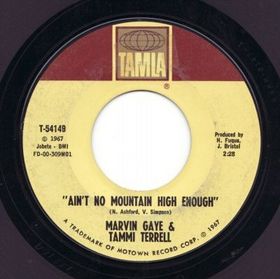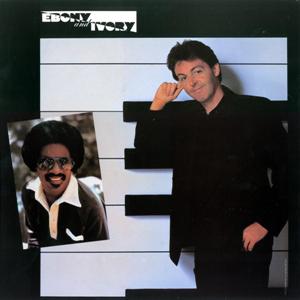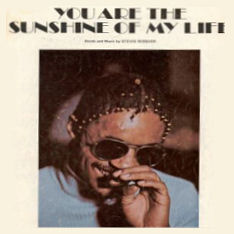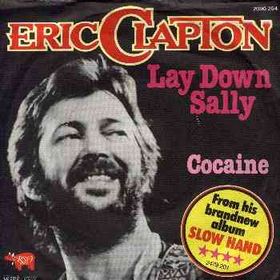
Hotter than July is the nineteenth studio album by American singer, songwriter, and musician Stevie Wonder, released on September 29, 1980, by Tamla, a subsidiary of Motown Records. Wonder primarily recorded the album in Los Angeles at Wonderland Studios, which he had recently acquired. The album peaked at number three on the Billboard Top LPs & Tapes chart and was certified Platinum by the Recording Industry Association of America (RIAA) on February 3, 1981. It was Wonder's most successful album in the UK, where it peaked at number two on the UK Albums Chart and produced four top ten singles. Music videos were produced for the album's first, third, and fourth singles.

"Ain't No Mountain High Enough" is a song written by Nickolas Ashford & Valerie Simpson in 1966 for the Tamla label, a division of Motown. The composition was first successful as a 1967 hit single recorded by Marvin Gaye and Tammi Terrell, and became a hit again in 1970 when recorded by former Supremes frontwoman Diana Ross. The song became Ross's first solo number-one hit on the Billboard Hot 100 chart and was nominated for the Grammy Award for Best Female Pop Vocal Performance.

"Tears in Heaven" is a song by English guitarist, singer, and songwriter Eric Clapton and Will Jennings, written about the death of Clapton's four-year-old son, Conor. It appeared on the 1991 Rush film soundtrack. In January 1992, Clapton performed the song in front of an audience at Bray Studios, Berkshire, England for MTV Unplugged, with the recording appearing on his Unplugged album.

"I Just Called to Say I Love You" is a ballad written, produced, and performed by American R&B singer and songwriter Stevie Wonder. It was a major international hit, and remains Wonder's best-selling single to date, having topped a record 19 charts.

"Ebony and Ivory" is a song that was released in 1982 as a single by Paul McCartney featuring Stevie Wonder. It was issued on 29 March that year as the lead single from McCartney's third solo album, Tug of War (1982). Written by McCartney, the song aligns the black and white keys of a piano keyboard with the theme of racial harmony. The single reached number one on both the UK and the US charts and was among the top-selling singles of 1982 in the US. During the apartheid era, the South African Broadcasting Corporation banned the song after Wonder dedicated his 1984 Academy Award for Best Original Song to Nelson Mandela.

"After Midnight" is a rock song by J. J. Cale, first released in 1966. Eric Clapton later covered it for his eponymous album, released in 1970. Clapton's rendition became a success, prompting Cale to re-record the song for Cale's 1971 album Naturally. In 1987, Clapton later re-recorded the song for a Michelob beer commercial and then released the re-recording as a single. "After Midnight" has been considered one of Clapton's signature songs throughout his career. Other artists covered the song in later years.

"I Was Made to Love Her" is a soul music song recorded by American musician Stevie Wonder for Motown's Tamla label in 1967. The song was written by Wonder, his mother Lula Mae Hardaway, Sylvia Moy, and producer Henry Cosby and included on Wonder's 1967 album I Was Made to Love Her.

"Until You Come Back to Me (That's What I'm Gonna Do)" is a song written by Morris Broadnax, Clarence Paul, and Stevie Wonder. The song was originally recorded by Stevie Wonder in 1967, but his version was not released as a single and did not appear on an album until 1977's anthology Looking Back. The best-known version of this song is the 1973 release by Aretha Franklin, who had a million-selling top 10 hit on Billboard charts. The song reached No. 1 on the R&B chart and No. 3 on the Hot 100 chart in 1974. It became an RIAA Gold record.

"Signed, Sealed, Delivered " is a soul song, by American musician Stevie Wonder, released in June 1970 as a single on Motown's Tamla label. It spent six weeks at number one on the U.S. R&B chart and peaked at number three on the U.S. Pop chart. In the same year, the song was also released on the album Signed, Sealed & Delivered.

"You Are the Sunshine of My Life" is a 1973 single released by Stevie Wonder. The song became Wonder's third number-one single on the Billboard Hot 100 chart and his first number-one on the Easy Listening chart. It won Wonder a Grammy Award for Best Male Pop Vocal Performance, and was nominated for both Record of the Year and Song of the Year. This song was the second single released from the 1972 album entitled Talking Book, which stayed at number one on the R&B albums chart for three weeks.

"Part-Time Lover" is a song by American R&B singer and songwriter Stevie Wonder, released as the first single from his twentieth studio album, In Square Circle (1985). The song reached number one on the Billboard Hot 100, R&B, dance, and adult contemporary charts, becoming Wonder's final number one hit to date. The song's simultaneous chart successes made Wonder the first artist to score a number-one hit on four different Billboard charts. The song was also released as a special 12" version. Lyrically, it tells the story of a man who is cheating on his wife with a mistress, only to find out in the end that his wife is cheating on him as well.
"Love Can Build a Bridge" is a song written by Naomi Judd, Paul Overstreet, and John Barlow Jarvis, and recorded by American country music duo the Judds. It was released in 1990 as the second single and title track from their album of the same name. It was a top-five country hit in mid-1991. The song has inspired several cover versions, including one by Cher, Chrissie Hynde, Neneh Cherry, and Eric Clapton that topped the UK Singles Chart in 1995.

"Change the World" is a song written by Tommy Sims, Gordon Kennedy, and Wayne Kirkpatrick and recorded by country music artist Wynonna Judd. A cover version was recorded by English singer Eric Clapton for the soundtrack of the 1996 film Phenomenon. Clapton's version was produced by R&B record producer Kenneth "Babyface" Edmonds.

"My Father's Eyes" is a song written and performed by British musician Eric Clapton and produced by Clapton and Simon Climie. It was released as a single in 1998 and was featured on Clapton's thirteenth solo studio album, Pilgrim (1998). The song reached the top 40 on the US Billboard Hot 100 Airplay chart, peaking at number 16, which remains his last top-40 hit in said country as of 2023. It also spent five weeks at number two on the Billboard Hot Adult Contemporary chart. It became a top-five hit in Canada, where it peaked at number two, and reached the top 20 in Austria, Iceland, and Norway. In 1999, it won a Grammy Award for Best Male Pop Vocal Performance.
"Superstar" is a 1969 song written by Bonnie Bramlett and Leon Russell, with a songwriting credit also given to Delaney Bramlett, that has been a hit for many artists in different genres in the years since. The best-known versions are by the Carpenters in 1971, and by Luther Vandross in 1983.

"Two Out of Three Ain't Bad" is a power ballad performed by the American musician Meat Loaf. It is a track off his 1977 album Bat Out of Hell, written by Jim Steinman. It spent 23 weeks on the Billboard Hot 100, peaking at #11, and earned a million-selling Gold single from the RIAA, eventually being certified platinum. It remains his second-highest charting hit in the US, behind "I'd Do Anything for Love " (1993), and stands as one of his career signature tunes.

"Lay Down Sally" is a song performed by Eric Clapton, and written by Clapton, Marcy Levy, and George Terry. It appeared on his November 1977 album Slowhand, and reached No. 3 on the Billboard Hot 100 chart.

"For Your Love" is a song written and performed by American musician Stevie Wonder, released in February 1995 as the first single from his 22nd album, Conversation Peace (1995). It won two Grammy awards for Best R&B Male Vocal Performance and Best R&B Song at the 38th Grammy Awards.

"I Can't Stand It" was the first single from Eric Clapton's 1981 album Another Ticket. On the record label for the vinyl 45, its credited as Eric Clapton and His Band. It was also used for interludes on Bill O'Reilly's radio show, The Radio Factor.

"Promises" is a single released by the British rock musician Eric Clapton in September 1978. It is part of his studio album Backless.



















